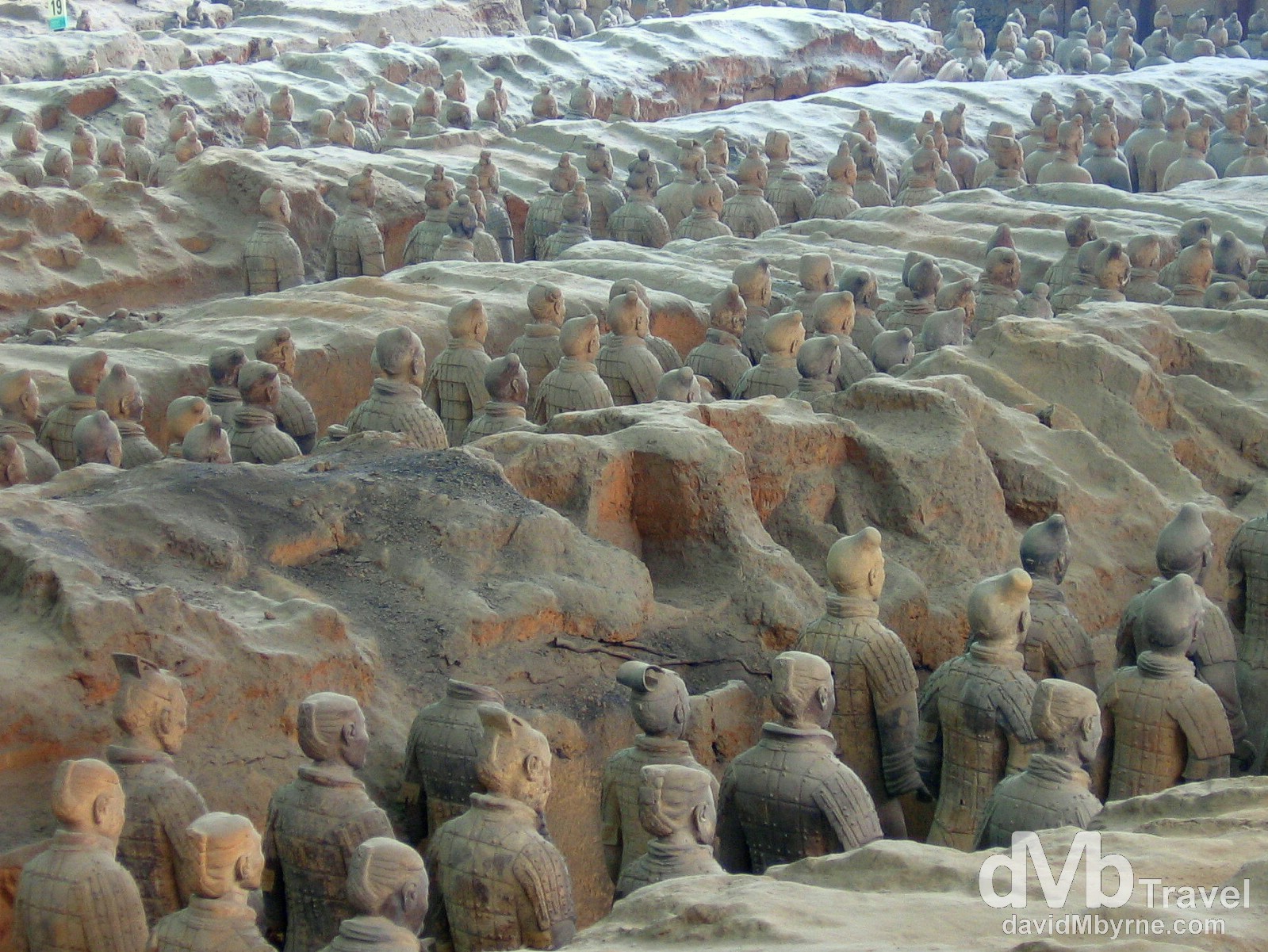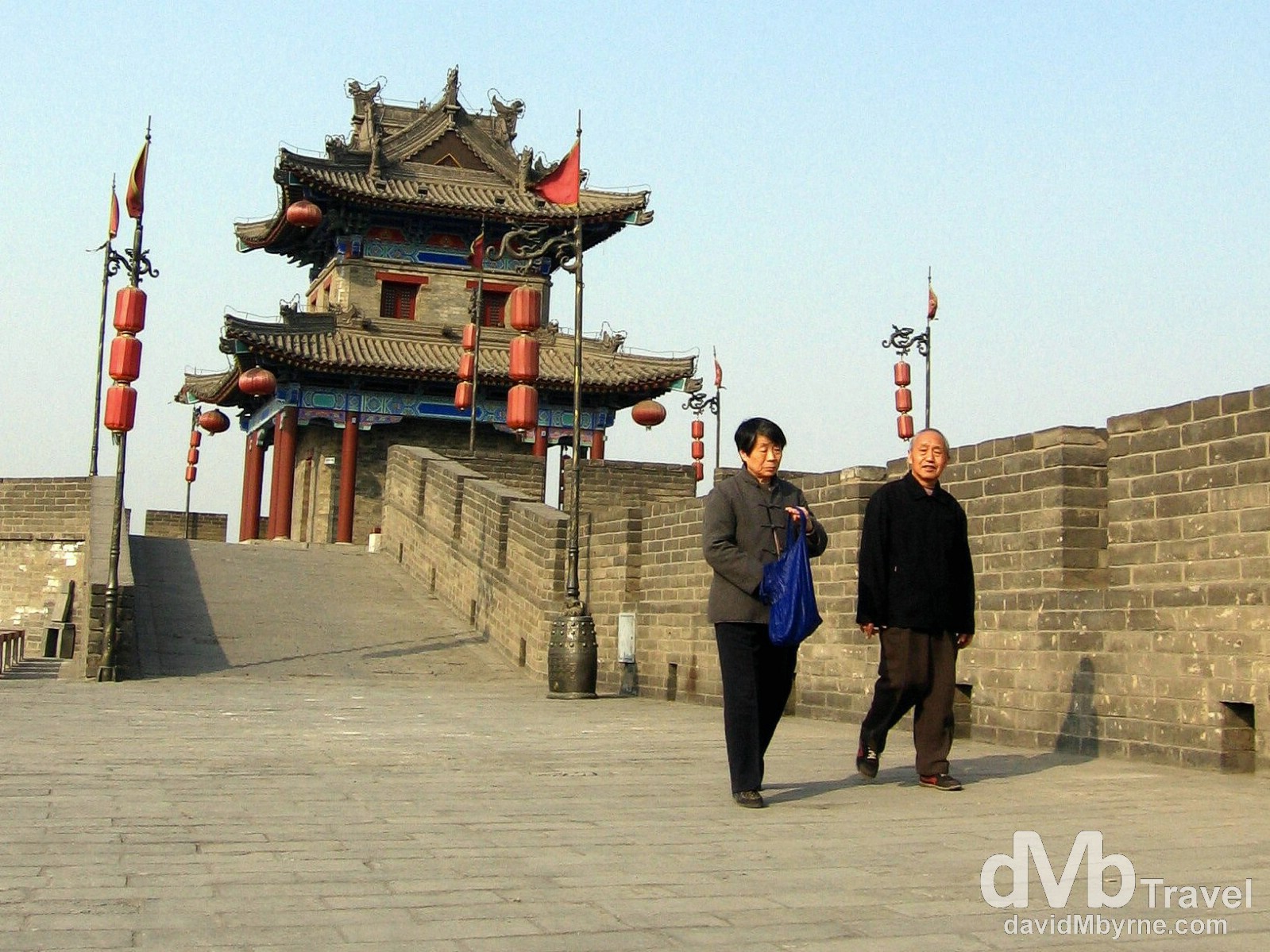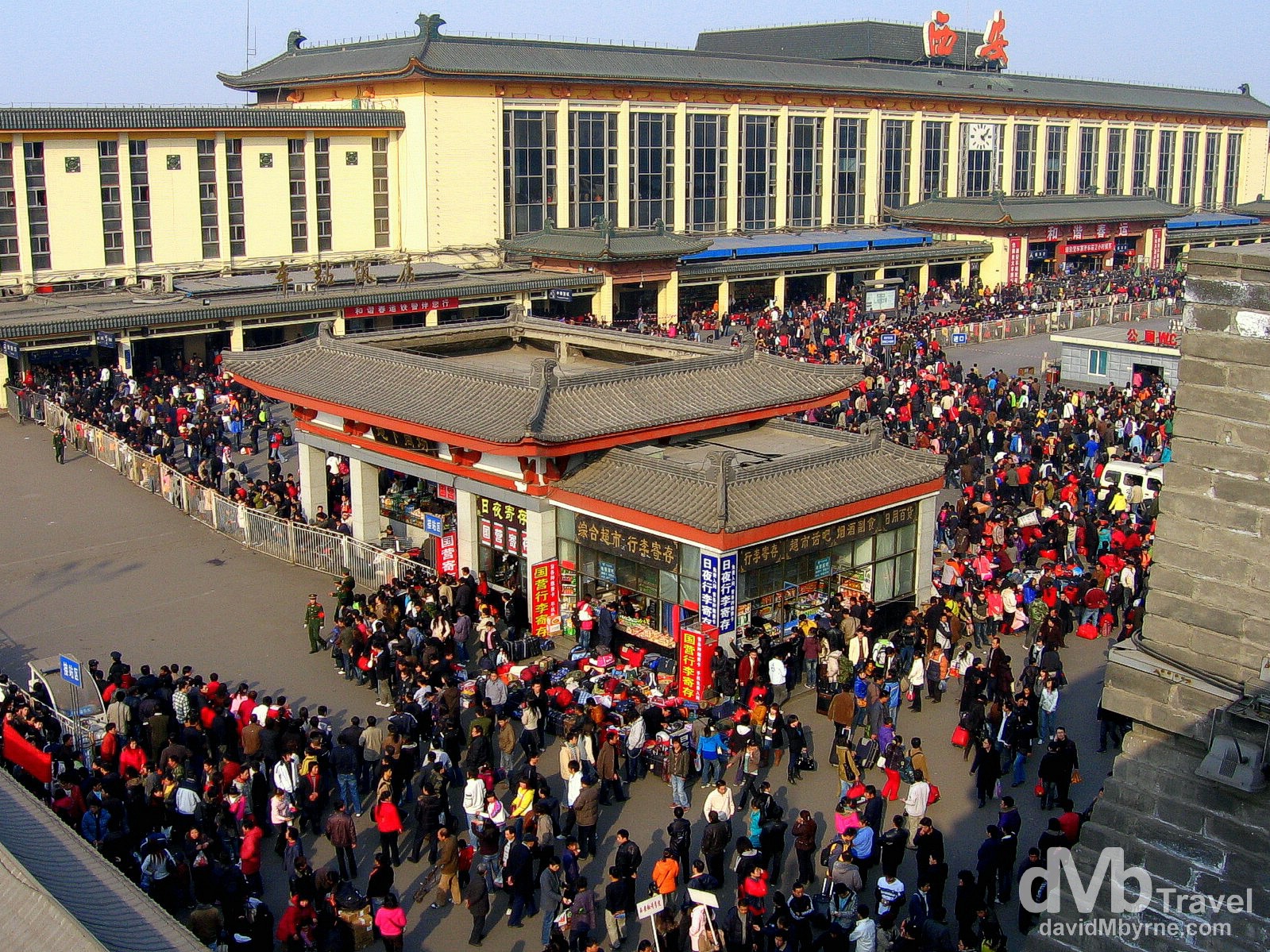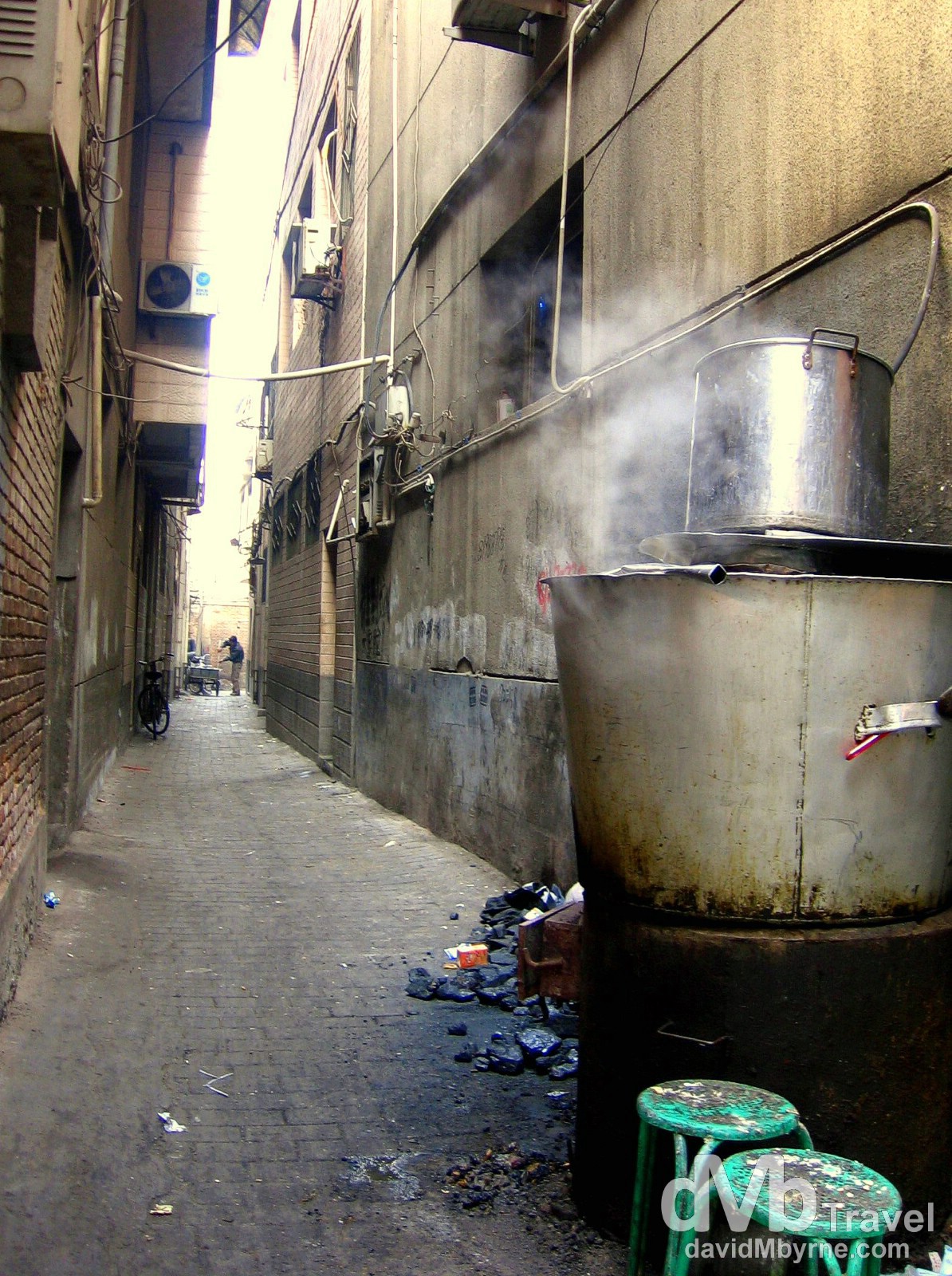As soon as we arrived in Xi’an a few days ago off the overnight train from Beijing we were trying to organise our way out of the city. Maybe it’s because we’d spent more time than planned in Beijing. Or maybe it was because I hadn’t initially planned on paying a second visit to Xi’an, the capital of China’s Shaanxi province.
Xi’an
The capital of China’s Shaanxi province, Xi’an is one of China’s 4 historical & ancient capitals and thus one of the country’s most historic cities. Beginning with emperor Qin Shi Hunag, who reigned from 247-210 BC, it served as the imperial capital to 11 dynasties. At its height it would have rivalled Rome or Constantinople as the greatest city on earth but today it’s just another big Chinese city, albeit one that boasts few nice tourist attractions – wandering around the Muslim Quarter, viewing the city from its beautiful central Bell Tower, and circling the city atop its 14th century city walls, one of the best preserved examples of city walls left in China, are must-dos for any visitor to the city.
Killing Time || February 22nd, 2008
I had intended on getting the train straight from Beijing to Lhasa in Tibet, our next stop, but Pat wanted to come to Xi’an to see the famed Terracotta Army/Warriors. That wasn’t a problem for me and admittedly it’s a great reason, if one were needed, for coming here; it is after all one of China’s top tourist draws and probably the only reason most people who do find themselves dealing with Xi’an are here. But top draw or not, it’ll consume half a day of your time at most. A half a day. At most. We’re now here 3 days and have another one to kill before we board the train for Lhasa. We’ve already seen what we want to see here – we’ve ogled at the city’s 14th century city walls (but have yet to scale them), we seen the city’s central Bell Tower, we’ve visited the Muslim district and yes, we’ve been to see the aforementioned Terracotta Army.

A picture captured in vault 1 of the UNESCO World Heritage listed Terracotta Army, rightly one of China’s premier sights. I blogged in detail of a previous, 2004 visit to the Terracotta Army so I’ll not bother here. Shaanxi Province, China. February 21st, 2008.
______________________________________________________________________
Tibet Logistics
So, as I type we still have one more day to wait. Actually, one-and a-half more days to wait. The reason being is the logistics of organising onward travel to Tibet, an Autonomous region of China & somewhere foreign tourists require a special permit in order to legally visit. Rumour has it that these days travel to Tibet is possible without the money-making permit so on our first day here we dashed around the city trying to buy train tickets sans permit, something that is officially illegal for a foreigner to do.
“Not tickets available.” we were told in the cattle mart that is Xi’an’s train station, and
“Train ticket no problem, but need permit.” by each and every travel agent we sauntered into.
The arbitrary prices we were quoted for the permit ranged from RMB400 (€40) to RMB700 (€70) and we eventually decided that the piece of mind afforded to us by having the permit (it’s unlikely but you could technically be refused boarding on the train without the permit) was worth the €40 asking price.
“Permit afternoon Friday.” we were told, meaning
“Could get train ticket for Saturday.”
Done and done. All for €140.
So Saturday morning it is then. 8:48 a.m. Saturday morning to be precise. We’ll board the Sky Train, the Lhasa Express, the Rocket to The Rooftop of the World (call it what you will) and will be travelling on the new Qinghai – Tibet Railway, the world’s highest railway. We’ll be riding the rails for 36 hours & travelling some 2,860 kilometres, much of which travels cross the massive Tibetan Plateau, a.k.a. The Rooftop of the World. Needless to say it’s no ordinary train. Nope, as it’s the highest train in the world much of the track is built on permafrost, ground that is permanently frozen. The highest altitude we’ll reach will be 16,640 feet (just over 5000 metres) but not that we’ll notice – seemingly oxygen is pumped into the carriages to prevent nice folk like myself and Pat suffering the ill effects of altitude sickness. Given the once in a lifetime nature of the trip we’ve decided to splash out for good berths on the train so we’re going soft sleeper, meaning if we’re lucky we’ll be sharing a cozy compartment with two other travellers and if we’re really lucky we’ll have it all to ourselves. Dining car meals, landscape gazing and trolley-lady beers and are all ahead of us. Oh, the tolls of life.
______________________________________________________________________
Passing Time
What to do until then? Well, as I type we only have a one-and-a-half days to kill before the departure for Lhasa. That’s not too bad. We might just, shock horror, take it easy, enjoy some self-imposed down time ahead of what lies ahead. We tried finding a few good bars in the city but seemingly there are none. We also thought about going to a nearby Taoist (a popular Chinese religious system based on the teachings of Lao-tzu) mountain but quickly realised how dumb an idea that was. Why would we leave our €13 a night hotel, with its €0.40 beers, cute waitresses and free Wi-Fi internet access to go lugging our sorry asses up a mountain someone other than ourselves deemed holy? Exactly. Tonight is the last night of the Chinese Lunar New Year celebrations and if my last Chinese New Year ending celebration experience is any indication then tonight will be an interesting (and noisy) night.
______________________________________________________________________
Smile. We’re Out of Here || February 23rd, 2008
______________________________________________________________________
We’ve just passed our last day in Xi’an. The waiting for the train is almost over. As I type we’re sitting in our hotel restaurant savouring our last few €0.40 beers and trying, one last time, to get a smile out of some of the cute albeit stone-faced waitresses that have served us breakfast, dinner (& beer) each & every day we’ve been here. No luck so far and our time is fast running out. Earlier today we walked around the city, stumbling upon a whole street full of bars. Yep, a whole street, a bar district if you will. It’s probably best we discovered it when we did and not earlier in the week. We also collected our train tickets from the nice agent who only charged us €10 for job of getting them and we then we walked for about 7 or 8 kilometres back to our hotel via the top of Xi’an’s impressive 14th century city walls, commenting on the city from our vantage point.

Walking atop the city walls in Xi’an, one of China’s 4 historical & ancient capitals. Beginning with emperor Qin Shi Hunag, who reigned from 247-210 BC (221-210 BC over a unified China), Xi’an served as the imperial capital to 11 dynasties and at it’s height it would have rivalled Rome or Constantinople as the greatest city on earth. Today it’s just another big Chinese city, albeit one of the most historic ones. A definite highlight of any visit to Xi’an is circling the central city atop its 14th century (built in 1370) city walls, one of the best preserved examples of city walls left in China – the Beijing city walls were long since pulled down. The Chinese have always laid out their cities in a spiritually favourable rectangular pattern, typically facing south on a north-south axis and surrounded by a defensive wall. This was done to favour Feng shui, a form of geomancy which assesses how buildings must be positioned so as not to disturb the spiritual attributes of the surrounding landscape. Xi’an’s city walls, acting as a barrier to the outside world, are 12 metres high, 18 metres deep at the base and 12 kilometres in length. They are capped with crenulations, a watchtower at each corner (one of which is seen here) and fortress-like gates in the centre of each side, now major roadways. An impressive Bell Tower sits right in the middle of the city enclosed by the walls in a direct line from each of the 4 gates, a simple design which makes for getting around the city a piece of cake. Xi’an (![]() ), Shaanxi Province, China. February 22nd, 2008.
), Shaanxi Province, China. February 22nd, 2008.
And that, as one might say, is that from Xi’an. We had dinner earlier but the beers we’ve had since has made us hungry. We’re not in the mood for rice, noodles or dumplings, not in the mood to search out the meat in the so-called meat and vegetable dishes they serve up in here. We’re in the mood for a bit of the west so we’re heading out now to get a Big Mac, or maybe two. There’s a McDonald’s around the corner, one we’ve been aware of since we arrived in the city and one we’ve avoided for long enough. Still no smile from the waitresses. Bugger that anyway. That’s a lost cause if ever there was one.
______________________________________________________________________
Observations From || Xi’an
· Sleeping beauty
Pat loved his first Chinese overnight train experience. Our 13 hour overnight trip from Beijing to Xi’an was a standard enough trip. We went hard sleeper class and after taking a walk down the whole length of the train Pat was in agreement with me that it wouldn’t have been as enjoyable had we been with the locals in hard seat class.

Crowds outside the main train station in Xi’an as seen from atop the 14th century city walls. Amazingly at any one time there are 10 million people riding on Chinese trains but there must be so many more hanging around outside the stations themselves. We’ve no idea why they do what they do; they come hours before train departure time and just sit around, playing cards, eating and waiting. Makes for quite a sight, especially from our position on the city walls. Xi’an, Shaanxi Province, China. February 22nd, 2008.
· Raping and Pillaging
Pat reckons we’re raping and pillaging the country. He thought Beijing was cheap and can’t understand how Xi’an is actually cheaper (it is). €13 for a nice hotel room (we could have spent a lot less but we do have standards), €1 for a cross town taxi ride (with tip), €0.40 for a 600ml bottle of beer, €1 for a dish in a local restaurant. Pat says the fact that things are so cheap is ‘not right’ and he had difficulty believing me when I told him that places like India are actually cheaper. Over our few beers this evening we flicked through the India guidebook Pat so kindly brought with him (we are, if anything, well-geared nomads) and with the aid of xe.com, which isn’t (yet) blocked in China, he has finally accepted the fact that yes, India will be cheaper than here in China.
· Made in China
Speaking of which, even the aforementioned guidebook on India that Pat brought with him from Dublin is, you’ve guessed it, Made in China.
· Pollution
I never noticed it to be as bad on two previous trip to China but the pollution levels here in Xi’an the past few days have been chronic. The city centre Bell Tower was less than 100 yards away but we had difficulty making it out as it was shrouded in an ugly haze most of the time.
· Spittoon
The Chinese like to spit. Of course they do & it doesn’t take long once you get to China to realise that. All that pollution that stings our western eyes plays havoc with their God-given lungs, that and the 40-a-day, back-alley cigarettes they smoke. The sound of them coughing up their latest green (or yellow) masterpiece is never pretty but it’s a way of life out here. Pat notices it a lot. Again I’ve told him it’s so much worse in India.
· “Hello, just looking!”
We’ve probably heard that hundreds of times over the last few days. It seems to be the standard line in English that stall/shop owners use to entice you into their premises.
· A change for the better
Chinese taxis drivers seem to have left their scamming days behind them. We noticed this in Beijing too. Yep, they pick you up and actually agree to bring you precisely where you want to go. No more stone-faced refusals and no more unnecessary detours. And they even turn on the meter. Progress.

A lane in the Muslim district of Xi’an, Shaanxi Province, China. February 20th, 2008.
· Young Authority
All of the police officers or soldiers out here look positively 12 years old and to a man/boy they look like they have to grow into their uniforms.
· Return To Sender
If at once you don’t succeed, try and try again. At least until such time as you decide enough is enough. Pat’s breakfast order yesterday came complete with mouldy toast. Nice. Pat took it well: said mould won’t kill you regardless of the colour. That’s probaly true but he sent it back to the kitchen anyway. His toast came a back a few minutes later, with the same mould on it. It was returned to the kitchen unconsumed (but well analysed), no doubt only to make a 3rd appearance on some other plate. Waste not want not.
· Hassle free
We’re not getting any hassle on the streets. There aren’t too many westerners around here (well there might still be a few but with the sheer numbers of Chinese around it’s not hard for a foreigner to go unnoticed by other foreigners) but we are yet to be accosted on the streets for as much as a photograph. No tour sellers, no art students. There are, of course, a few beggars and we’re still getting incessantly stared at but nothing more. We can handle that. For now.
· Spreading the dirt
The Chinese don’t go in for actual cleaning per se. We think it’s because they realise it’s a waste of time, what with all the dust in the air the place will be just as dirty the next day. One example is the poor old, short-straw drawing city street sweeper. He or she seems to adopt an approach where they just move the dirt around to make a nice even layer of dirt. They don’t actually remove the dirt (what’s the point?), they just move it around with their medieval looking brooms, smoothing the dirt out into nice even dust blankets, blankets that seem to cover the whole country.
· Got to Look busy
Following on from the last point is that there seems to be so many people over here doing nonsense, unnecessary jobs. Take the Xi’an city workers for example. There are hundreds of them on the streets and their main jobs seems to be just to stand around looking busy and, in the street sweepers case at least, move dirt around. However, sitting around and obviously looking like you’re doing nothing seems to be a big no-no. The amount of nonsense jobs getting done is amazing, from the street sweeper right down to the lady washing the street side lampposts. But we reckon with so many people to go around (there are 1.3 billion people in the country) people can be employed to appear to do something when they actually don’t do anything at all. Communism.
· English?
We hope they speak English in Tibet. Pat asked me tonight what language we’re going to have to try to speak in Tibet.
“I dunno lad. I reckon Tibetan, Chinese and, emm English. Hopefully”, I said.
· Bijo
Pat tried bijo this evening, that potent (56%), liver killing stuff the Chinese seem to like. He didn’t mind it either, but still didn’t finish the little bottle I bought him. He went against my better advice to one-shot it, deciding to sip it instead. Seemingly he wanted to ‘taste it’ even though I told him one shouldn’t attempt to be a snob where bijo is concerned (at least not the stuff he was sampling). The verdict? It seemingly tastes similar to grappa, Italian brandy made from grapes.
______________________________________________________________________
